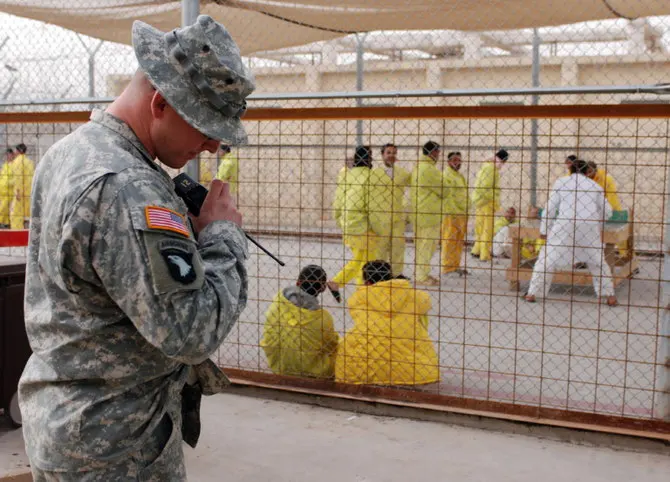The US government has apparently failed to compensate Iraqis who were tortured or abused two decades after evidence surfaced that US forces mistreated inmates at prisons they ran in Iraq, Human Rights Watch said on Monday.
About 100,000 Iraqis were detained by the US and its coalition allies between 2003 and 2009 after the US invasion of Iraq in 2003.
HRW and other organzations documented torture and other abuse by US forces in Iraq. Survivors of abuse have given accounts of the treatment they suffered, but have received little recognition from the US government and no compensation.
“Twenty years on, Iraqis who were tortured by US personnel still have no clear path for filing a claim or receiving any kind of redress or recognition from the US government,” said the Washington director at HRW, Sarah Yager.
“US officials have indicated that they prefer to leave torture in the past, but the long-term effects of torture are still a daily reality for many Iraqis and their families,” Yager said.
Between April and July 2023, HRW interviewed a former detainee at the notorious Abu Ghraib prison called Taleb Al-Majli and three anonymous people with knowledge of his detention, and condition after his release.
He claims to be one of the men in a photograph that was circulated widely showing a group of naked, hooded prisoners on top of one another in a human pyramid, while two US soldiers smiled behind them.
“Two American soldiers, one male and one female, ordered us to strip naked. They piled us prisoners on top of each other. I was one of them,” Al-Majli said.
Al-Majli said that US forces detained him while he was visiting relatives in Anbar province in 2003 during a round-up of old men and boys in the village he was staying in.
After being held for a few days at Habbaniya military base and at an unknown location in Iraq, US forces moved Al-Majli to Abu Ghraib prison.
“It was then the torture started. They took away our clothes. They mocked us constantly while we were blindfolded with hoods over our heads. We were completely powerless. I was tortured by police dogs, sound bombs, live fire and water hoses,” he said.
HRW said his story of detention at Abu Ghraib is credible and that Al-Majli presented corroborating evidence, including a prisoner identity card with his full name, inmate number and cell block, which he said US forces issued him at Abu Ghraib after taking his photo, iris scan and fingerprints.
Al-Majli also showed the organization a letter he obtained in 2013 from the Iraqi High Commission for Human Rights, a governmental body with the mandate to protect and promote human rights in Iraq, confirming his detention at Abu Ghraib prison, including his date of arrest, and listing the same inmate number as his prisoner identity card.
For two decades, he has sought compensation and an apology for the abuse he was subjected to. He sought help from the Iraqi Bar Association and the Iraqi High Commission for Human Rights but they could not assist. He said that he did not know how to contact the US military and raise a claim.
HRW wrote to the US Department of Defense in June 2023 outlining Al-Majli’s case and requesting information on compensation for survivors of torture in Iraq. No response was received.
“The US secretary of defense and attorney general should investigate allegations of torture and other abuse of people detained by the US abroad during counterinsurgency operations linked to its ‘Global War on Terrorism,’” Yager said.
“US authorities should initiate appropriate prosecutions against anyone implicated, whatever their rank or position. The US should provide compensation, recognition and official apologies to survivors of abuse and their families,” she said.
The organization has found no evidence that the US government has paid any compensation or other redress to victims of detainee abuse in Iraq, nor has the US issued any individual apologies or made other amends.—AN










